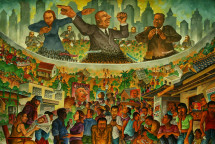Back to the commons: emancipatory rural politics in Galiza
Topics
Regions

Authors
Much of rural Galiza has been for decades an almost uncontested stronghold for the Spanish right-wing Partido Popular and its predecessors. Most of these rural municipalities are characterized by small, dispersed and aging populations, lack of employment for youth and continuous dismantlement of basic services. The 1936-39 civil war and subsequent dictatorship attempted to erase the memory of rural emancipatory politics and the grass-roots institutions where it emerged and developed.
Lousame, a municipality with 3,500 inhabitants in the West of Galicia, fits within this pattern but also displays signs of emerging social contestation. In 2015 a libertarian municipalist platform gained 12% of the vote and was close to depriving the right wing from its majority. Simultaneously, the grass-roots civil society collective “Coluna Sanfins” was formed taking its name from the anarcho-syndicalist column that left Lousame in July 1936 to fight the military coup.
The collective has been catalytic in mobilizing popular resistance against government-backed destructive projects such as industrial waste landfills, mining operations or common land grabbing, while reconnecting current struggles with the local emancipatory movements of the past and inspiring care and connection with the land. The process of reclaiming institutions of rural direct assembly democracy in traditional Common Land Communities is especially significant.
Lousame currently has 32 Commons Assemblies that self-manage almost half of the municipality’s territory. Commons Assemblies are outside of the system of State institutions and self-manage important services such as water, wood for heating and cooking, common village machinery and also represent a significant contribution to household economies. The shift to repoliticize traditional commons institutions as tools for emancipation outside the logics of capitalist modernity is the focus of this paper. Through the study of a small commons community in Lousame, insights are gained on how these experiences can contribute to emancipatory rural politics elsewhere.
This paper was presented at the Emancipatory Rural Politics Initiative (ERPI) 2018 Conference: "Authoritarian Populism and the Rural World"